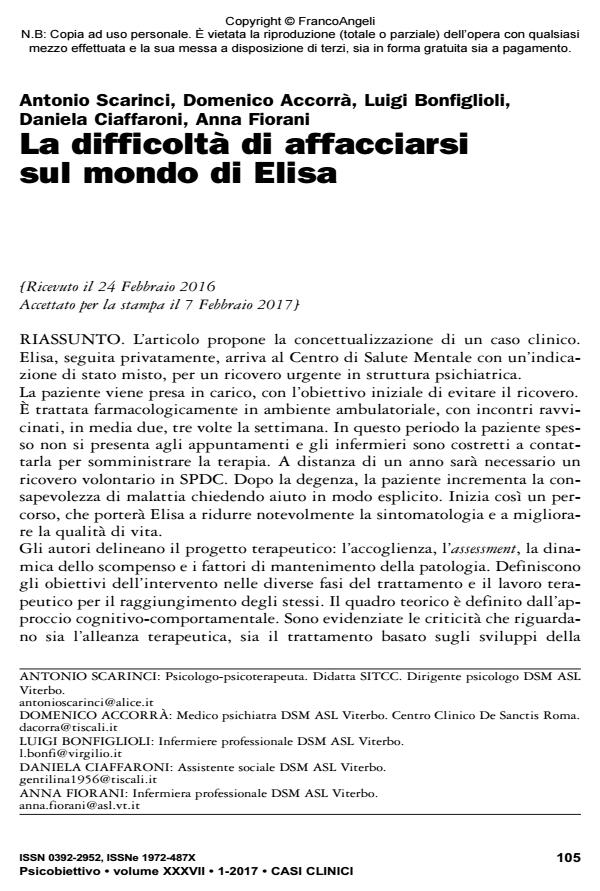The challenges of entering Elisa’s world
Journal title PSICOBIETTIVO
Author/s Antonio Scarinci, Domenico Accorrà, Luigi Bonfiglioli, Daniela Ciaffaroni, Anna Fiorani
Publishing Year 2017 Issue 2017/1
Language Italian Pages 15 P. 105-119 File size 760 KB
DOI 10.3280/PSOB2017-001007
DOI is like a bar code for intellectual property: to have more infomation
click here
Below, you can see the article first page
If you want to buy this article in PDF format, you can do it, following the instructions to buy download credits

FrancoAngeli is member of Publishers International Linking Association, Inc (PILA), a not-for-profit association which run the CrossRef service enabling links to and from online scholarly content.
The article proposes the conceptualization of a clinical case. Elisa, who is followed privately, arrives at the Mental Health Center with an indication of mixed state requiring an urgent hospitalization in psychiatric structure. The patient is taken in charge with the initial objective of avoiding hospitalization. She is pharmacologically treated in an ambulatory with close encounters, on average two, three times a week. In this period, the patient often does not show up for appointments and nurses are forced to contact her to deliver therapy. After one year an admission to SPDC will be necessary. After the hospitalization she increases her awareness of illness asking explicitly for help. Thus began a path that will bring Elisa to greatly reduce the symptoms and to improve the quality of life. The authors outline the therapeutic project: the acceptance, the assessment, and the dynamics of the decompensation and the maintenance of the disease factors. They define the objectives of the intervention in the different stages of treatment and the therapeutic work to attain them. The theoretical framework is defined by the cognitive-behavioral appro-ach. The critical issues that concern both the therapeutic alliance, the treatment based on the developments of LIBET (Life themes and plans Implications of biased Beliefs: Elicitation and Treatment) and Metacognition Therapy are highlighted.
Keywords: Cognitive-Behavioral Therapy; Metacognitive Therapy; Mood Disorder; Cognition Attentional System; Life Themes and Plans Implications of Biased Beliefs: Elicitation and Treatment.
Antonio Scarinci, Domenico Accorrà, Luigi Bonfiglioli, Daniela Ciaffaroni, Anna Fiorani, La difficoltà di affacciarsi sul mondo di Elisa in "PSICOBIETTIVO" 1/2017, pp 105-119, DOI: 10.3280/PSOB2017-001007